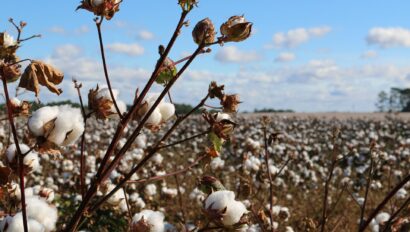A transition to regenerative agriculture is fundamental to the long-term health of the fashion and textile industry, states new report from Textile Exchange
Download Regenerative Agriculture Landscape Analysis Press Release
Going forward, Textile Exchange calls on brands to invest in inclusive and credible regenerative agriculture projects that can boost the resilience of the industry within our planetary boundaries. Brands should also ensure that those who are the direct stewards of the land, including Indigenous people, communities of color, and farmers, or their chosen representatives, have an active decision-making role in any regenerative project from the start.
Beth Jensen, Climate+ Strategy Director, Textile Exchange said: “Regenerative agriculture is about growing raw materials in alignment with natural systems and Indigenous practices. It’s a complete contrast to the extractive approach that has become the norm in recent years, but it doesn’t fit neatly into a single definition or set of practices. While this can be a challenge for companies, it’s also an opportunity to lift up farmers and growers as the essential leaders in this movement.”
Géraldine Vallejo, Sustainability Programme Director, Kering said: “Regenerative agriculture can provide multi-benefits for nature and communities, and it is direly needed to help reverse the trend of climate and biodiversity loss. At Kering, we are working with partners and farmers on the ground to scale projects through the “Regenerative Fund for Nature” in partnership with Conservation International. This is not the time to wait for others to take the lead – we must all invest in supporting regenerative practices as a matter of urgency. This report provides brands with a thoroughly researched and practical roadmap on how to get started.”
Arif Makhdum, Agronomist & Country Manager Pakistan, CottonConnect said: “If smallholder farmers are empowered to use regenerative farming practices, they can replenish the land for current and future generations, boosting yields while building resilience to climate change. This way, farmers and their families will thrive, and so will our planet.”
Liz Hershfield, Senior Vice President & Head of Sustainability, J.Crew Group and Senior Vice President of Sourcing, Madewell said: “At J.Crew and Madewell, we have identified regenerative agriculture as a critical step forward on our journey towards reducing our impact. Textile Exchange continues to push the envelope with its innovative approaches to the endemic issues that plague the retail industry, we’re grateful to be supporting that research.”
Sarah Kelley, Common Threads Consulting said: “It was an honor to work with Textile Exchange’s team on the Regenerative Agriculture Landscape Analysis, bringing critical perspectives on the Indigenous roots of regenerative agriculture together with the latest soil science and research on regenerative agriculture’s co-benefits. We hope this report will lay out the pathway for action in the industry.”
Link to report: https://textileexchange.org/regenerative-agriculture-landscape-analysis/
Image link here
Photo credit: Alice Aedy
About Textile Exchange
Textile Exchange is a global non-profit driving positive impact on climate change across the fashion and textile industry. It guides a growing community of brands, manufacturers, and farmers towards more purposeful production from the very start of the supply chain.
Its goal is to help the industry to achieve a 45% reduction in the emissions that come from producing fibers and raw materials by 2030. To get there, it is keeping its focus holistic and interconnected, accelerating the adoption of practices that improve the state of our water, soil health, and biodiversity too.
For real change to happen, everyone needs a clear path to positive impact. That’s why Textile Exchange believes that approachable, step-by-step instruction paired with collective action can change the system to make preferred materials and fibers an accessible default, mobilizing leaders through attainable strategies, proven solutions and a driven community.
At Textile Exchange, materials matter. To learn more, visit textileexchange.org.
Media Contact: Pe-Jae Brooks, Marketing and Communication Manager, mailto:pejae@textileexchange.org
